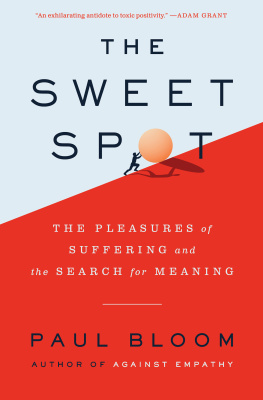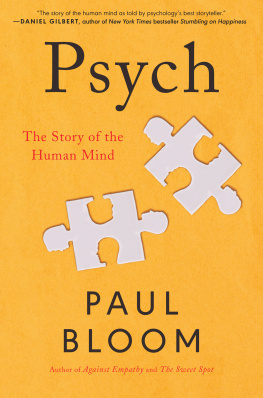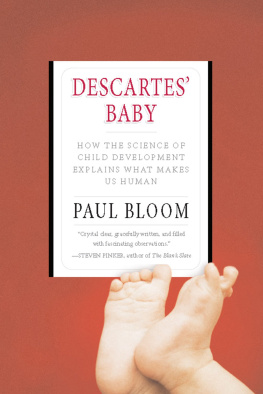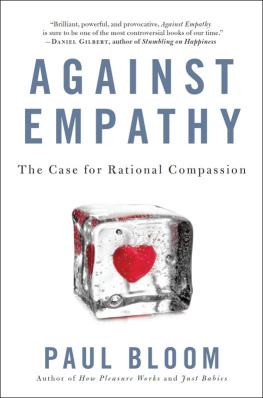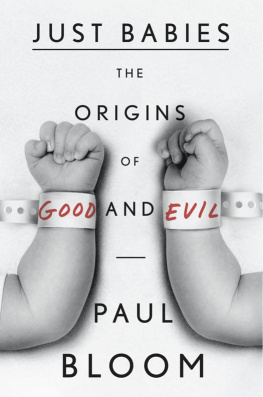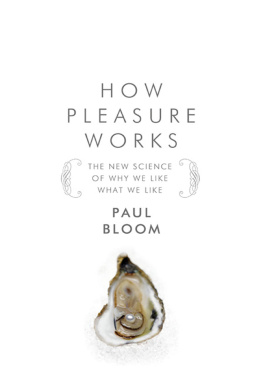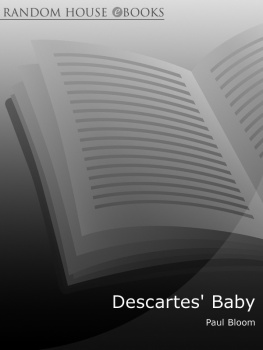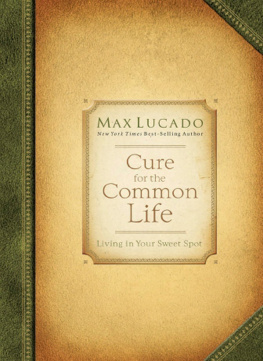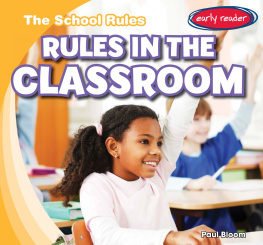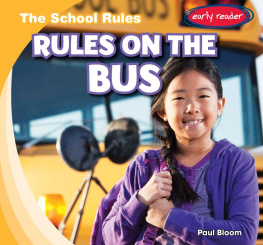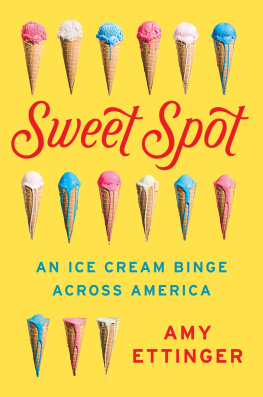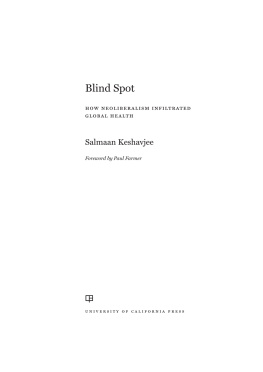Paul Bloom - The Sweet Spot
Here you can read online Paul Bloom - The Sweet Spot full text of the book (entire story) in english for free. Download pdf and epub, get meaning, cover and reviews about this ebook. year: 2021, publisher: Ecco, genre: Religion. Description of the work, (preface) as well as reviews are available. Best literature library LitArk.com created for fans of good reading and offers a wide selection of genres:
Romance novel
Science fiction
Adventure
Detective
Science
History
Home and family
Prose
Art
Politics
Computer
Non-fiction
Religion
Business
Children
Humor
Choose a favorite category and find really read worthwhile books. Enjoy immersion in the world of imagination, feel the emotions of the characters or learn something new for yourself, make an fascinating discovery.
- Book:The Sweet Spot
- Author:
- Publisher:Ecco
- Genre:
- Year:2021
- Rating:3 / 5
- Favourites:Add to favourites
- Your mark:
- 60
- 1
- 2
- 3
- 4
- 5
The Sweet Spot: summary, description and annotation
We offer to read an annotation, description, summary or preface (depends on what the author of the book "The Sweet Spot" wrote himself). If you haven't found the necessary information about the book — write in the comments, we will try to find it.
The Sweet Spot — read online for free the complete book (whole text) full work
Below is the text of the book, divided by pages. System saving the place of the last page read, allows you to conveniently read the book "The Sweet Spot" online for free, without having to search again every time where you left off. Put a bookmark, and you can go to the page where you finished reading at any time.
Font size:
Interval:
Bookmark:
For Christina,
sui generis
I knew what it felt like to lie awake, shivering in an inadequate sleeping bag, too cold to sleep and almost too afraid to try. Now, as I slogged through deep snow and deeper darkness toward my tent, tripping and scraping my shins on chunks of broken ice concealed by fresh powder, I reminded myself that I had come here intending to suffer.
Eva Holland, Get Schooled in the No-Nonsense Art of Survival, Outside
Man, the bravest animal and most prone to suffer, does not deny suffering as such: he wills it, he even seeks it out, provided he is shown a meaning for it, a purpose of suffering.
Friedrich Nietzsche, On the Genealogy of Morals
It hurts just as much as it is worth.
Zadie Smith, quoting from a condolence letter, in Joy, New York Review of Books
W hen life is going well, we can forget how vulnerable we are. But reminders are everywhere. There is always the possibility of paina sudden ache in the lower back, a cracked shin, the slow emergence of a throbbing headache. Or emotional distress, such as realizing that you just used Reply All to reveal an intimate secret. Such examples just touch the surface. There is seemingly no limit to the misery we can experience, often at the hands of others.
The simplest theory of human nature is that we work like hell to avoid such experiences. We pursue pleasure and comfort; we hope to make it through life unscathed. Suffering and pain are, by their very nature, to be avoided. The tidying guru Marie Kondo became rich and famous by telling people to throw away possessions that dont spark joy, and many would see such purging as excellent life advice in general.
But this theory is incomplete. Under the right circumstances and in the right doses, physical pain and emotional pain, difficulty and failure and loss, are exactly what we are looking for.
Think about your own favorite type of negative experience. Maybe you go to movies that make you cry, or scream, or gag. Or you might listen to sad songs. You might poke at sores, eat spicy foods, immerse yourself in painfully hot baths. Or climb mountains, run marathons, get punched in the face in gyms and dojos. Psychologists have long known that unpleasant dreams are more frequent than pleasant ones, but even when we daydreamwhen we have control over where to focus our thoughtswe often turn toward the negative.
Some of this book will explain why we get pleasure from these experiences. It turns out that the right kind of pain can set the stage for enhanced pleasure later on; its a cost we pay for a greater future reward. Pain can distract us from our anxieties, and even help us transcend the self. Choosing to suffer can serve social goals; it can display how tough we are or, conversely, can serve as a cry for help. Unpleasant emotions such as fear and sadness are part of play and fantasy and can provide certain moral satisfactions. And effort and struggle and difficulty can, in the right contexts, lead to the joys of mastery and flow.
This was going to be the topic of the entire book. It was going to be about how suffering can give rise to pleasure, and was going to be called, not cleverly, The Pleasures of Suffering. But as I talked with friends and colleagues and read the work of psychologists, philosophers, and other scholars, I began to have doubts. The theories that work for hot baths and sad songs and spankings turn out not to apply more generally. A lot of the negative experiences we pursue dont provide happiness or positive feelings in any simple sensebut we seek them out anyway. Suffering, yes; pleasure, no.
Think now of a different kind of chosen suffering. People, typically young men, sometimes choose to go to war and, while they dont wish to be maimed or killed, they are hoping to experience challenge, fear, and struggleto be baptized by fire, to use the clichd phrase. Some of us choose to have children, and usually we have some sense of how hard it will be; maybe we even know of all the research showing that, moment by moment, the years with young children can be more stressful than any other time of life. (And those who dont know this ahead of time will quickly find out.) And yet we rarely regret our choices. More generally, the projects that are most central to our lives involve suffering and sacrifice. If they were easy, what would be the point?
The importance of suffering is old news. It is part of many religious traditions, including the story in Genesis of how original sin condemned us to a life of struggle. It is central to Buddhist thoughtthe main focus of the Four Noble Truths. It is at the core of Max Webers notion of the Protestant work ethic.
Even scholars who disagree on everything else agree about the value of suffering. Toronto, the city where I wrote most of this book, recently hosted a debate between the Canadian psychologist Jordan Peterson, a prominent critic of postmodernism, and Slavoj iek, a celebrity philosopher of the far left. Their topic was happiness. In an article about this debate, The Chronicle of Higher Education profiled the men, quoting their views and pointing out some similarities. Apparently, they both respect suffering. The purpose of life, Peterson has written, is finding the largest burden you can bear and bearing it, while iek believes that the only life of deep satisfaction is a life of eternal struggle. I find these quotes a bit floriddoes the struggle really have to be eternal?but still, in their recognition of the centrality of suffering, these men are my brothers.
T HE S WEET S POT does a few things at the same time. Much of it addresses specific questions that I find interesting and I think you will, too. Why do some people like horror movies? Why do some adolescents cut themselves? Whats the lure of BDSM? Does unchosen sufferingthe death of a child, saymake us more resilient? Does it make us more kind? What will doubling your salary do to your happiness? How will having children influence your sense that your life has meaning?
But The Sweet Spot also defends a broader picture of human nature. A lot of people think that humans are natural hedonists, caring only about pleasure. I want to convince you that a close look at our appetite for pain and suffering shows that this view of humanity is mistaken. It turns out that we are inclined toward something deeper and more transcendent.
But Im not dissing pleasure, either. Instead, this book will defend the idea that there are many things that people wanta view sometimes called motivational pluralism. My view here jibes with that of economist Tyler Cowen, who recently wrote:
Whats good about an individual human life cant be boiled down to any single value. Its not all about beauty or all about justice or all about happiness. Pluralist theories are more plausible, postulating a variety of relevant values, including human well-being, justice, fairness, beauty, the artistic peaks of human achievement, the quality of mercy, and the many different and, indeed, sometimes contrasting kinds of happiness. Life is complicated!
Finally, some of the ideas and findings described in this book can be of practical use. I often think back to two books I read long agoFlow, by Mihaly Csikszentmihalyi, and Mans Search for Meaning, by Viktor Frankl. Neither is a self-help book in any simple sense. But each makes claims about human nature and human flourishing that have led many people to rethink how they should live.
Ill talk more about Frankl later, but let me say something about Flow. For much of my life I would find myself lost in difficult pursuits, such as training for a marathon or learning to code. But I rarely gave this much thought. Then I read what Csikszentmihalyi had to say about the centrality of such flow states to happiness and flourishing. And I realized, for the first time, that these pursuits had value. They were far more important to me than I had realized. And so I consciously decided to try to spend more of my life in the state of flow, which made me happier and more fulfilled.
Font size:
Interval:
Bookmark:
Similar books «The Sweet Spot»
Look at similar books to The Sweet Spot. We have selected literature similar in name and meaning in the hope of providing readers with more options to find new, interesting, not yet read works.
Discussion, reviews of the book The Sweet Spot and just readers' own opinions. Leave your comments, write what you think about the work, its meaning or the main characters. Specify what exactly you liked and what you didn't like, and why you think so.

